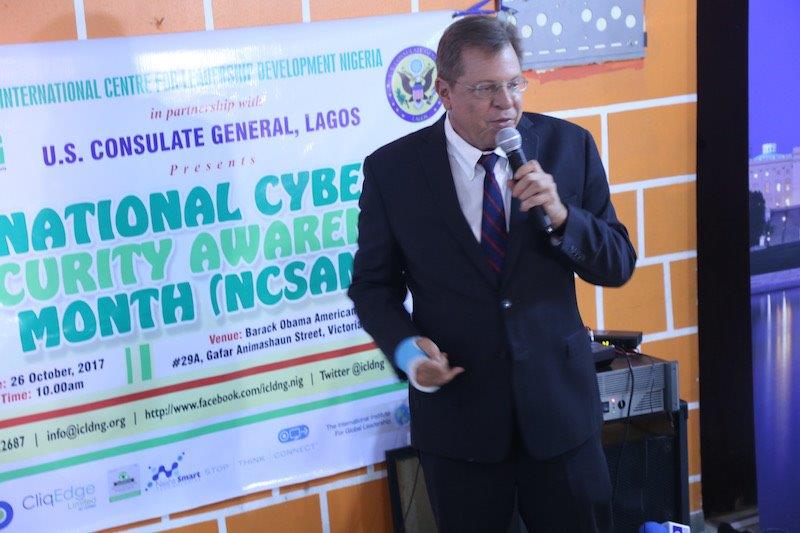World economies seen losing more than $6 trillion annually to cybercrime by 2021
October 26, 20172.5K views0 comments
The global community may lose up to $6 trillion annually to cybercrime by 2021, according to F. John Bray, consul general of the United States in its opening remarks at the 14th National Cyber-security Awareness Month in Lagos Tuesday.
Bray said billions of dollars are lost through cybercrimes globally every year, and that with the number of Internet users growing daily, law enforcement officials expect the number of victims to increase as well as the value of their losses.

“Cybersecurity Ventures predicts that the global community will lose more than $6 trillion annually by 2021, he said, adding that without good cyber-security in place, experts estimate that nearly half of the entire G-20 economy will be lost to cybercriminals.
“The “Internet of Things (IoT)” will continue to increase the amount of crimes we see.” He pointed out describing the ‘Internet of Things’ as the technology used in Bluetooth and Wifi devices in homes (i.e. refrigerators, dishwashers, and microwaves).
He said the devices can be hacked and used in a malicious manner to cause serious harm and that the national public awareness campaign, through the cybersecurity awareness month, is a collaborative effort between government and industry that encourages individuals to protect their computers and our nation’s critical cyber infrastructure.
“All around the globe we have seen individuals, companies, and governments become the victims of cyberattacks.
“For this reason, in 2009 President Obama called for an increase in education and dialogue about Cybersecurity in the Cyberspace Security Review. As part of this policy review, the Department of Homeland Security created an ongoing Cybersecurity awareness campaign – Stop.Think.Connect,” he noted.
According to Bray, the Stop.Think.Connect. is a national public awareness campaign designed to raise awareness of cybersecurity and to be more vigilant about practicing safe online habits.
By joining the Stop.Think.Connect campaign one will have connections to partners and subject matter experts who are committed to increasing online safety; cybersecurity tips, messaging, articles, and presentations; monthly discussions highlighting current cyber issues and trends.
“People are spending more time online – at home and at work — than ever before.
Our growing dependence on technology, coupled with the increasing threat of cyber-attacks and risks to our privacy, demands greater security in our online world,” he said adding that cyber awareness is everyone’s responsibility.
He said international cooperation and information sharing are key to the successful mitigation of cyber-attacks and specifically noted that the African Union has joined other international organizations in designating October as Cybersecurity awareness month.
Indeed cyber attacks on financial institutions are becoming more common and considerably more sophisticated. High-profile cases like the Equifax breach, which compromised the confidentiality of 143 million Americans’ credit information, and the theft of US$81 million from Bangladesh Bank, are just two examples of recent cyber breaches in the financial industry.
Today, cyber risk is a permanent threat to financial institutions and the proper functioning of the highly interconnected financial system. Banks of all sizes experience cyber attacks every day. Breaches of individual firms can cause adverse knock-on effects for other financial and nonfinancial firms and give rise to systemic risk, a new dimension of cyber risk that is little understood.
